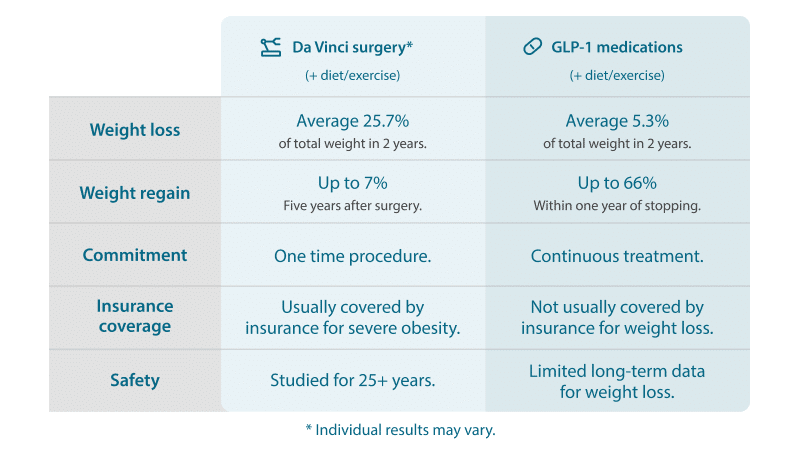When it comes to weight loss solutions, much of the conversation is now dominated by GLP-1 medications – so much so that you may think they are the best, easiest and only solution for obesity.
However, it is important to remember that there are no one-size-fits-all weight loss solutions. In fact, the trusted providers at Longstreet Clinic’s Center for Weight Management want everyone to understand that there are many different approaches that they utilize to help patients realize significant and lasting weight loss. And while our surgeons and doctors recommend GLP-1 medications for some patients, they also believe that surgical weight loss offers excellent outcomes for many others – and may even be preferable for certain patients. They also recognize that the best treatment option for you may vary at different points in your life.
At the Center for Weight Management, our experienced surgeons utilize the latest bariatric surgical techniques, including the Da Vinci robotic system. In fact, advancements like this have helped make bariatric surgery as safe as other common procedures like hernia, appendix, and gallbladder surgery. However, we also understand that making the commitment to bariatric surgery is never easy and that thought of taking medicines is preferable for some patients. But how do you know which solution is best for you?
The answer depends on knowing as much as possible about your health and your approach to care. The first solution to any weight loss – always – should be diet and exercise. But if those approaches have not yielded success, it is certainly worth looking closer at other solutions. With that in mind, let’s look at some of the parameters, as well as pros and cons, of GLP-1 medications vs. weight loss surgery.
Let’s start by learning more about the variety of options available to patients seeking weight loss solutions.
GLP-1 medications
The acronym for this medication stands for Glucagon-like peptide-1. Taken at regular intervals, GLP-1 meds stimulate your body to produce the hormone insulin. The increased presence of insulin in your body slows down gastric emptying so that you feel full for a longer time. The result is a massively reduced appetite. These drugs are not new. In fact, they were approved for treatment of type 2 diabetes in 2005. However, they began to be used as weight loss medications in 2014. And now there are many brands on the market, including Ozempic, Mounjaro, Wegovy and Zepbound.
Bariatric surgery
Weight loss surgery is a safe and common approach to addressing obesity. Bariatric surgery typically includes restricting and reshaping the stomach and gastrointestinal tract so that it holds less food and thus helps the patient to require less food and feel full longer. These procedures allow patients to have one surgery that makes it easier to lose weight and keep weight off in perpetuity. Bariatric surgery includes options such as the gastric sleeve, gastric bypass, and duodenal switch.
In addition to the three procedures mentioned above, Longstreet also offers bariatric procedures that are effective for weight loss but are non-surgical. This includes the ORBERA Balloon System and Endoscopic Sleeve Gastroplasty (ESG). But since these are not technically bariatric surgeries, when we refer to bariatric surgery in this discussion we are referring to gastric sleeve, gastric bypass, and duodenal switch.
While this basic understanding is helpful – it doesn’t really tell you which is the right choice for you. To make that decision, you need to fully understand your own weight and complete health situation.
What is Your Weight?
Obesity is recognized by the National Institute of Health (NIH) as having a Body Mass Index (BMI) of 30 and above. A BMI above 35 is recognized as class II obesity, while a BMI of 40 or above is class III obesity. All phases of obesity are recognized as chronic diseases.
Do you Have Any Other Conditions?
Obesity often helps cause other health problems. Referred to as comorbidities, these concerns range from high blood pressure, diabetes, sleep apnea, arthritis, stress incontinence, acid reflux, hypercholesterolemia (high cholesterol), and beyond.
Why does this Matter?
GLP-1s are an approved treatment for those with a BMI over 30, or a BMI over 27 with at least one comorbidity like type 2 diabetes, hypertension or sleep apnea.
Bariatric surgery, meanwhile, is typically approved for patients with a BMI of 40 or a BMI of 35 with comorbidities.
Other Factors to Consider
Those patients looking to secure and maintain significant and long-lasting weight loss should understand that there are other differences between the weight loss you may experience with GLP-1 drugs vs. that experienced after bariatric surgery with the Da Vinci system.
Time
As this article from the American Society for Metabolic and Bariatric Surgery (ASMBS) notes, bariatric surgery is proven to deliver more significant weight loss over a two-year period than certain GLP-1 medications. And the National Institute of Health recognizes that bariatric surgery is the only effective treatment for long-term weight loss for those patients who have had no previous success with the traditional approaches of diet and exercise.
Weight Loss Goals
This study shows that GLP-1 users lose 5-15% of body weight over a one-year period. Meanwhile, as the ASMBS notes, bariatric surgery patients can lose up to 60% of excess weight within six months of surgery and 77% of excess weight within 1 year of surgery.
Lifestyle
GLP-1 medications can offer wonderful results, but they are dependent upon your continued use. And weight gain is a common result for some patients who halt their use of these medications. Bariatric surgery, meanwhile, carries its own commitments, including adjusting diet and vitamin intake, however its effects can last a lifetime.
Side Effects
We’ve already noted how safe bariatric surgery is compared with other procedures. There are side effects that may occur from GLP-1 medications, including possible serious risks if dosages are not correctly administered, but most side effects include dehydration and stomach issues, like nausea, diarrhea or constipation. However, there are few conclusive long-term studies of GLP-1 use in humans.
Weigh ALL the Information
The reality is that any aggressive and meaningful weight loss solution must be entered into with a full range of knowledge and understanding that only medical professionals can provide. That’s why the caring providers at Longstreet Clinic encourage anyone who is interested in any type of significant and medical weight loss to make an appointment with us – and to have an open mind.
Our doctors, nurses, dieticians, and staff work together to produce the best outcomes for your health and for your life. So, please contact us today by calling 770-534-0110 and learn more about GLP-1s and the robotic bariatric surgical options that we offer – and see what a difference they have already made for people like you.

